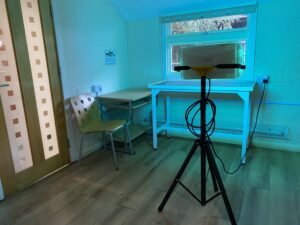For people running businesses from home offices what is the reality of UV-C light as a Covid deterrent? Could it be a solution for the millions of UK SME’s?
With Covid lockdowns and precautions set to last at least another six months, UK businesses are having to get used to operating in a restricted and curtailed fashion. The challenge of keeping premises safe and clean is one that is testing organisations of every size. The use of UV light to disinfect against Covid has been talked about in the media – but only in relation to large-scale sites such as hospitals or airports. Little has been said about UV usage on a smaller scale. We investigate …
Official cleaning guidelines
The latest Government guidelines for businesses include advice on implementing social distancing, the usage of face coverings, the tracing of customers and other safety measures. There is also specific guidance re ‘cleaning the workplace’. Advice regarding how to clean, depends on the type of business in question – the direction for restaurants and bars differs slightly to that for close contact services such as hairdressers and beauticians, for example. However, broadly speaking, guidance points to increased handwashing, provision of hand sanitiser, and making enough space to allow for ‘frequent cleaning, disinfection and sterilisation of work areas, tools and equipment between uses, using your usual cleaning products’.
This last point about using your usual cleaning products is interesting. The guidance here assumes firstly that these cleaning products will be readily available, which certainly was not the case during the height of the pandemic, and secondly that businesses have the capacity in terms of staff and time to conduct a deep-clean.
Like any manual process, the effectiveness of the deep clean will depend on how thorough and experienced the person doing the cleaning is. This is not to cast doubt on the good intentions of staff, rather, to acknowledge that thoroughly disinfecting any area is no easy task – particularly when it needs to be repeated daily, or even more frequently.
So what is UV-C light all about?
It’s important to note that it is UV-C light energy that has been shown to be beneficial, this is not the same as the UVA used in tanning beds or UVB which, as well as occurring naturally from sunlight exposure, is also used for curing within the dental industry. The size and cost of UV-C light solutions has previously been prohibitive to most organisations. Now, more portable lamp solutions are being developed, making this a solution that can work in any situation.
Businesses must be sure to research solutions thoroughly. A number of smaller, hand-held devices are currently flooding the market claiming to offer UV disinfection. However, these products are typically ineffective and, in fact, potentially do more harm than good if business owners believe their premises have been safely cleaned.
How does it work?
Generally speaking, UV light will kill microorganisms by damaging their DNA or RNA depending on the type of virus. The UV light breaks the microorganisms down on a molecular level, destroying existing bonds within the microorganisms and causing new ones to form. Once the microorganism’s DNA or RNA is severely damaged, it will no longer be able to function or survive. Portable UV-C light lamps can be plugged in, switched on and, within fifteen minutes, all viruses, bacteria and fungi within a defined area will be eliminated.
These UV-C light lamps are powerful, requiring users to leave the room while the lamp does its job. Remote control operation makes this an easy process. Additionally, air disinfection units are available which can remove harmful microbes from the air while rooms are still occupied.
Take-up amongst smaller businesses is quickly rising. Hertfordshire-based vet Lauren Hammond, who recently invested in UV solutions for her veterinary practice, comments: “We’re not replacing personal protective equipment with UV light, we’re adding extra layers of protection. UV is a very clever, safe and sensible idea that is saving our business time and, more importantly, helping our people and our visitors to feel less vulnerable.”
This sentiment is shared by Jennifer Green, a therapist based in Liverpool, who states: “We plug the lamp on and leave it in the room. Depending on the size of the room, the lamp will completely disinfect all surfaces in 15-30 minutes, meaning we can safely occupy that room and switch the lamp to another space. This investment was a response to the challenges of now. But it also enables us to future-proof against any future outbreaks or disruptions of a similar nature. That’s really reassuring.”
Could this help SME’s to get back to ‘normal’ and stay clean more easily?
Coronavirus is here to stay and businesses are looking to find solutions that enable a return to some semblance of normality. Manually cleaning premises is difficult, placing a strain on staff and resources. UV light – previously only a solution realistically affordable to larger-scale operations – is now portable, powerful and cost-effective for smaller businesses. Forward-thinking businesses are already benefitting.
Adapting his own business through covid to bring out portable devices for small areas and easier use, Keith Wyatt, director of UV Clean Light has pioneered the process in schools and hospitals to great success said: ‘We know it works, it physically destroys the covid virus on surfaces. We’re seen it work on a larger scale and have now opened up our products to be portable. It feels very good to have contributed something that has such a positive effect in these trying times.’
Have you had an experience with UV-C light in your business? Tell us about it. Contact cmartin@cbmeg.co.uk
